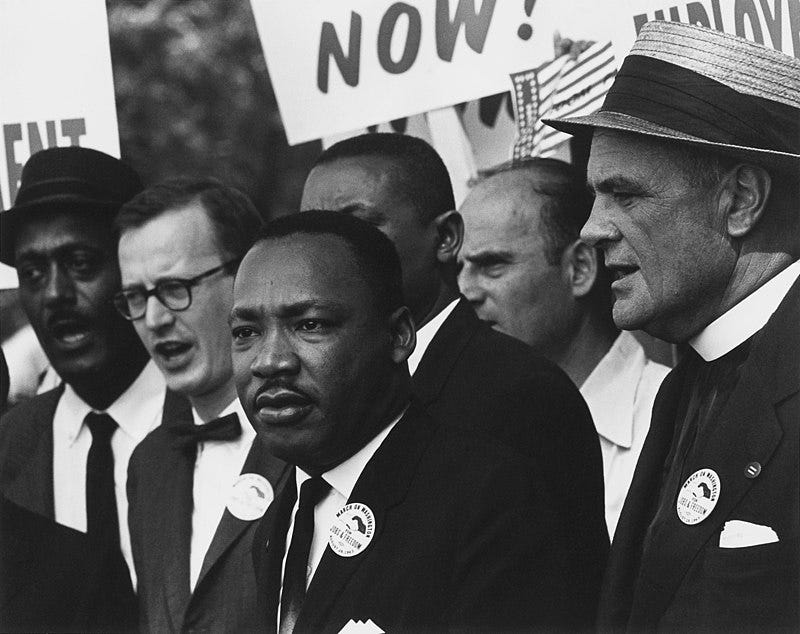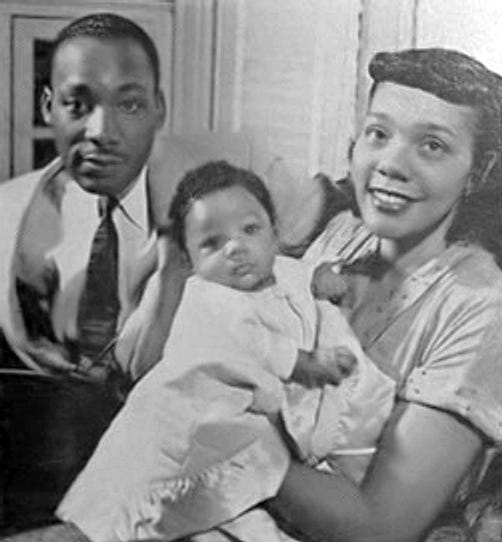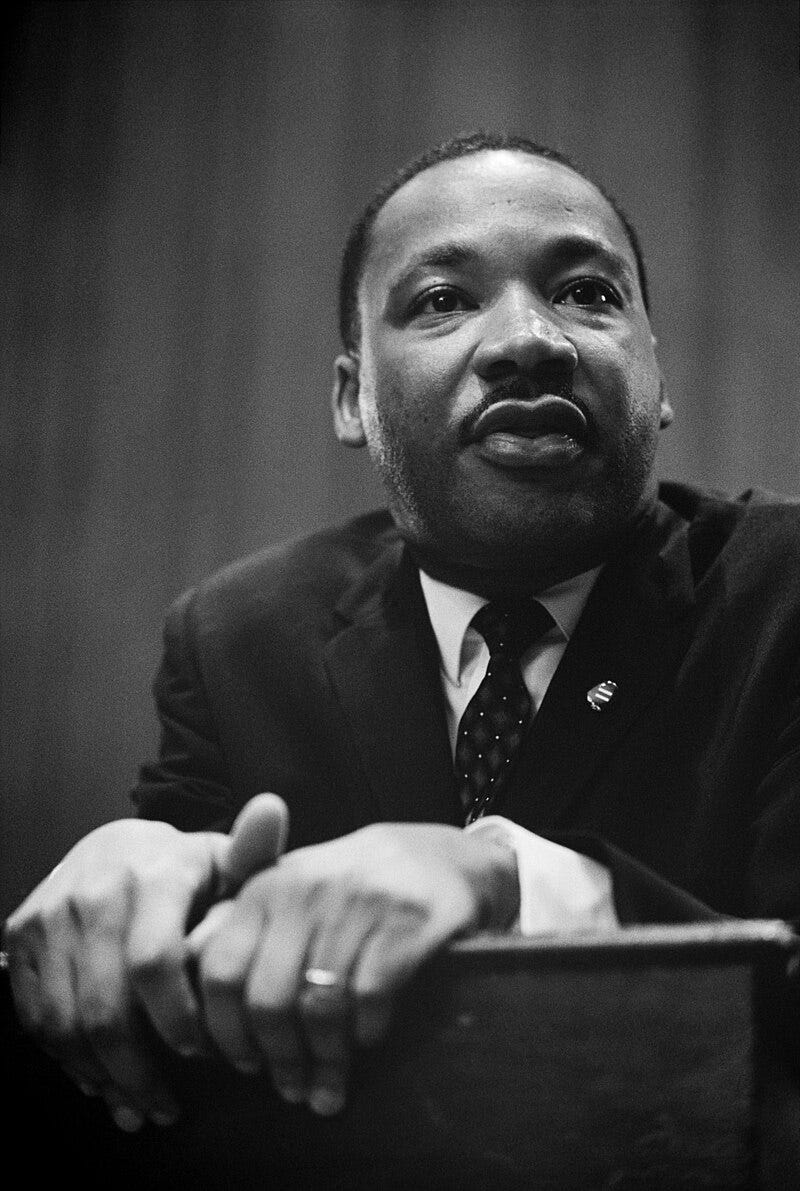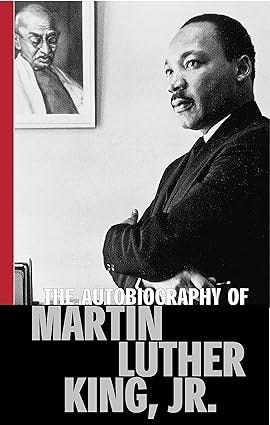Martin Luther King Jr.: Practicing What You Preach
If you follow your own rules, others will too
It was a Friday morning on September 28th, 1962, when Martin Luther King Jr. found himself in front of a passionate audience of 300. He had just been re-elected as the Southern Christian Leadership Conference (SCLC) president and was the final speaker in the auditorium. At 11:00 King addressed the crowd, describing the future charity events of the organization.
Within seconds, a man leaped up from the 6th row seat and climbed on stage. Before anyone realized what was happening, the man surged towards King and landed a sharp hook across King's jaw. At 188cm (6ft 2) the assailant sent King, 175cm (5ft 9), staggering.
King then dropped his arms and stood still, allowing the man to land another punch on his neck. Momentarily confused by King's reaction, he stood standing there in surprise. This split second break gave enough time for King's associates to rush and grab the man. The audience was now in an uproar, trying to push forward.
In all the chaos and himself shaken, King yelled ''Don't touch him! We have to pray for him.''
Once things had calmed down a bit, he approached the man and started quietly talking to him, and kept talking to him as he was led off the stage. When they reached backstage, King bought the man a soft drink to help him cool down. He wanted to know why the man was there, so he asked, ''Why did you want to hit me?''. They sat together and talked for 10 minutes.
The man was 24-year-old Roy James, a member of the American Nazi Party.
By now the police had arrived and were taking James away. King approached them and explained that he did not want to press charges. Later that day, both King and James were taken to a local city court. King told the judge, Charles H. Brown, that he was not going to file a complaint.
James' sentence was 30 days in the city jail and a $25 fine.
Civil rights activist Rosa Parks was in the crowd that day. ''That, for many of us,'' Parks would express, ''was proof that Dr. King believed so completely in nonviolence that it was even stronger than his instinct to protect himself from attack''.

Discovering Nonviolence
It is better to be the recipient of violence than the inflictor of it, since the latter only multiplies the existence of violence and bitterness in the universe, while the former may develop a sense of shame in the opponent, and thereby bring a transformation and change of heart
Martin Luther King Jr. was born on January 15th, 1929, to a long line of preachers, all the way from his father, grandfather and great-grandfather.
As a young child, King had a white playmate with whom he would play childhood games. One day when he was 6 years old, the boy's father demanded that they no longer play together. This was the first time he became aware of racial issues. The incident shocked him so deeply that from that moment on, he was determined to hate every white person.
In 1944, at the age of 15, King began his freshman year at Morehouse college. There he read Henry David Thoreau's essay ''On Civil Disobedience'', where he was exposed to the idea of nonviolent resistance for the first time. During those years he also joined an organization for racial justice. The group was racially mixed, and as he spent more time with white Americans, his attitude towards them softened.
Four years later, in 1948, King enrolled at Crozer Theological Seminary. His passion for reading continued, and his philosophical ideas continued to sway back and forth, although he developed a great sense of nuance. By this time, he had slowly lost hope in the power of love to solve racial issues. He began to believe that the only way to solve the problem of segregation was through armed revolt.
One Sunday afternoon, King travelled to nearby Philadelphia to attend a sermon by Dr. Mordecai Johnson. Dr. Johnson had returned from a trip in India, where he had learned about the life of Mahatma Gandhi. King left the meeting with a feeling so profound that he became absorbed by Gandhi's philosophy. The more he read, the more his belief in the power of love grew, and he finally saw its potential for social change.
The revelation had struck him, ''it was in this Gandhian emphasis on love and nonviolence that I discovered the method for social reform that I had been seeking''.
''Love our Enemies''
One night at a mass meeting, I found myself saying: ''If one day you find me sprawled out dead, I do not want you to retaliate with a single act of violence. I urge you to continue protesting with the same dignity and discipline you have shown so far''
Upon completing his theological studies, King and his wife, Coretta, decided that they had a moral obligation to return to the south. Despite the racial tension and sacrifices they would have to make, it was where King could have the strongest impact to tackle racial issues. So by the end of 1954, they had settled into Alabama, and King began his work as a pastor at the Dexter Avenue Baptist Church.
The following years would be strenuous for King and his family. Due to his work in pushing for racial equality, he would be continuously harassed, mistreated and arrested.
One ordinary morning, on January 30th, 1956, King left his house to attend a mass meeting at the First Baptist Church. During the meeting, the people in the crowd seemed uneasy. They would look at him then look away. King noticed several of his ministers rushing in and out of the church, and he knew something was wrong. Unable to keep his worries aside, he asked his closest friends what had happened. He was prepared for the worst.
''Your house has been bombed.'' Ralph Abernathy told him hesitantly.
Moments after receiving the devastating news, King addressed the crowd at the meeting. Calmly he urged ''each person to go straight home [...] and adhere strictly to our philosophy of nonviolence.''
Immediately after he was driven home. A crowd of hundreds had already gathered there along with policemen attempting to keep things under control. As he walked up to his house, he observed many people were armed and calling for violence. The first thing he did was to rush indoors and check on his wife Coretta and daughter Yolanda. They were both safe.
With tensions rising by the minute, King went outside and addressed the angry crowd. ''We believe in law and order,'' he quietly began, ''Don't get panicky. Don't do anything panicky at all. Don't get your weapons. He who lives by the sword will perish by the sword. Remember that is what God said. We are not advocating violence. We want to love our enemies. I want you to love our enemies. Be good to them. Love them and let them know you love them.''
He then looked over the crowd and saw a shift in the atmosphere. Voices shouted ''Amen'' and ''We are with you all the way, Reverend''. Many people had tears on their faces.
The crowd later dispersed without incident.

The Power of Forgiveness
To believe in nonviolence does not mean that violence will not be inflicted upon you. The believer in nonviolence is the person who will willingly allow himself to be the victim of violence but will never inflict violence upon another. He lives by the conviction that through his suffering and cross bearing, the social situation may be redeemed
Martin Luther King Jr. was at the Harlem department store on a Saturday afternoon in 1958. He was surrounded by a group of hundreds of people, all waiting to get an autograph for his book about the Montgomery bus boycott, Stride Towards Freedom.
''Are you Martin Luther King?'', an old woman from the crowd asked.
''Yes.'' King replied, thinking nothing of it.
Suddenly, he felt a sharp pressure on his chest. He had just been stabbed.
King was immediately rushed to the hospital for emergency surgery, where his whole chest had to be opened up to extract the blade.
The chief of surgery told King after the operation that the blade had been touching his aorta. ''If you had sneezed during all those hours of waiting,'' Dr. Aubrey Maynard explained, ''your aorta would have been punctured and you would have drowned in your own blood.''
The assailant was 42-year-old Izola Ware Curry, a woman suffering from delusions and schizophrenia. After being arrested at the scene, she was also found to be carrying a loaded gun.
Although the road to recovery was long and slow, King's faith in nonviolence was not shaken, if anything, after reflecting on the incident his resolve only grew stronger.
Five weeks later, King was well enough to return to his home in Montgomery. Upon arrival, a crowd of friends and supporters were waiting for him. The first thing he expressed was that he held no ill will toward the woman who had tried to take his life.
He expressed sympathetically, ''I am deeply sorry that a deranged woman should have injured herself in seeking to injure me. I can say, in all sincerity, that I bear no bitterness toward her and I have felt no resentment from the sad moment that the experience occurred. I know that we want her to receive the necessary treatment so that she may become a constructive citizen in an integrated society where a disorganized personality need not become a menace to any man.''

Practicing What You Preach
Martin Luther King Jr. lived a burdensome life in his pursuit for racial justice. He was harassed daily, arrested countless times, stripped of his rights, house bombed, and multiple attempts made on his life. The same hardships were lived by his friends, family and supporters of the movement.
With such a heavy burden on his shoulders, there were times when King's resolution wavered. He doubted himself. He wanted to give up. But he always found the strength to come back to what he believed in: nonviolence.
Since first crossing paths with nonviolent resistance from Gandhi's movement in India, King was convinced this was the right way to change society. In all of his sermons and speeches, regardless of the circumstances, he always preached nonviolence.
But more importantly, he also lived it.
When he was assaulted on stage by Roy James, he could have fought back as self-defence.
He could have hired bodyguards or armed himself after the bombing of his home.
He could have been angry at Mrs. Curry for gravely injuring him.
But instead he stuck to his principles. He didn't retaliate. He didn't become overly defensive. He didn't sink to hatred. He chose to forgive.
He practiced what he preached.
Taking Your Own Advice
The expression ''Do as I say, not as I do'' might come to mind when you notice someone that does not follow the standards that they're asking others to abide by.
That tends to happen since giving advice is easy. Everyone does it, and usually with good intentions. However, few people actually follow their own advice, because it's so much harder to do.
I know the advice you have to offer is valuable. So if you want to have a positive impact on the world, and have people listen to what you have to say, you need to practice what you preach.
Do the things yourself that you tell others to do. No matter how hard it is.
If you can't follow your own rules, how do you expect others to?
Post Script
On April 12th 1963, Martin Luther King Jr. was arrested for the 13th time. While in a cell in solitary confinement, he would write his famous 7000-word letter ''Letter from Birmingham Jail''.
Even in the worst of circumstances, King held strongly to his values of nonviolence, and found it in himself to express love and hope.
You can read a more detailed account of the story behind his letter in my mini article, Sticking to your Values.
Details about the events, quotes and excerpts are from The Autobiography of Martin Luther King, Jr., edited by Clayborne Carson.

Footnotes
Details on the continuous aggression and difficulties King faced throughout the years. A Man for This Season, by David Pilgrim (2000)
The morning when King was assaulted on stage by Roy James. When a Nazi punched Dr. King, NY Daily News (January 18, 2021)
The events surrounding King's attempted assassination by Izola Curry. Curry, Izola Ware, King Institute (March 7, 2015)
King's speech to friends and supports after his return home from the hospital. Statement Upon Return to Montgomery, King Institute (October 24, 1958)
Thanks very much for reading!
If you have any feedback, ideas, suggestions, things I can improve, anything at all, please let me know!
Heck, if there’s something I can help you with, I’ll try my best!
Leave a comment below, reply to my notes, join the subscriber chat, reach out on Reddit or Bluesky, or send an E-mail!
I’m always happy to keep in touch :)
Please share this article if you enjoyed reading it!
And if you want to read more articles every week, you can subscribe here:
See ya next time!
Matthieu




